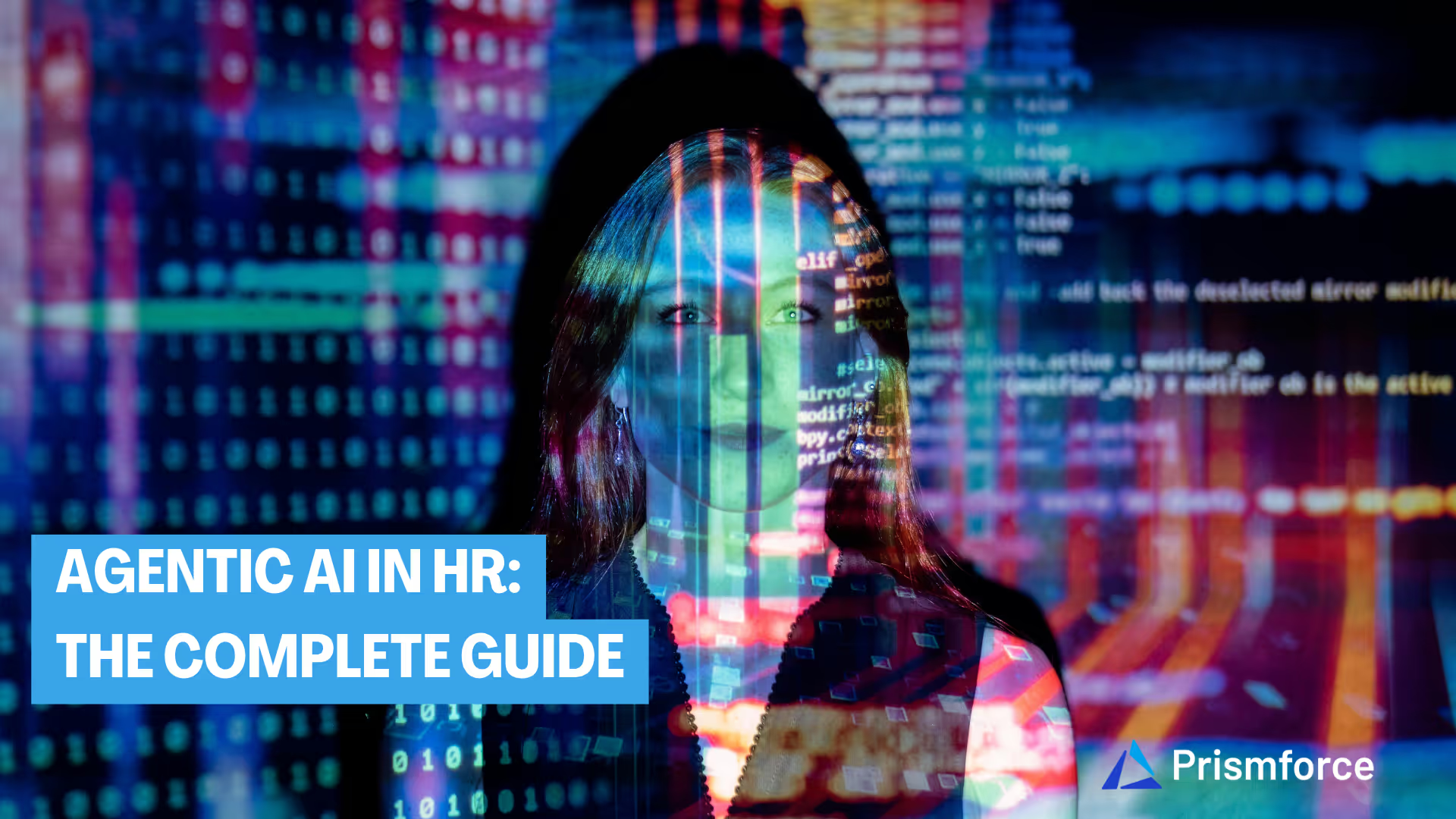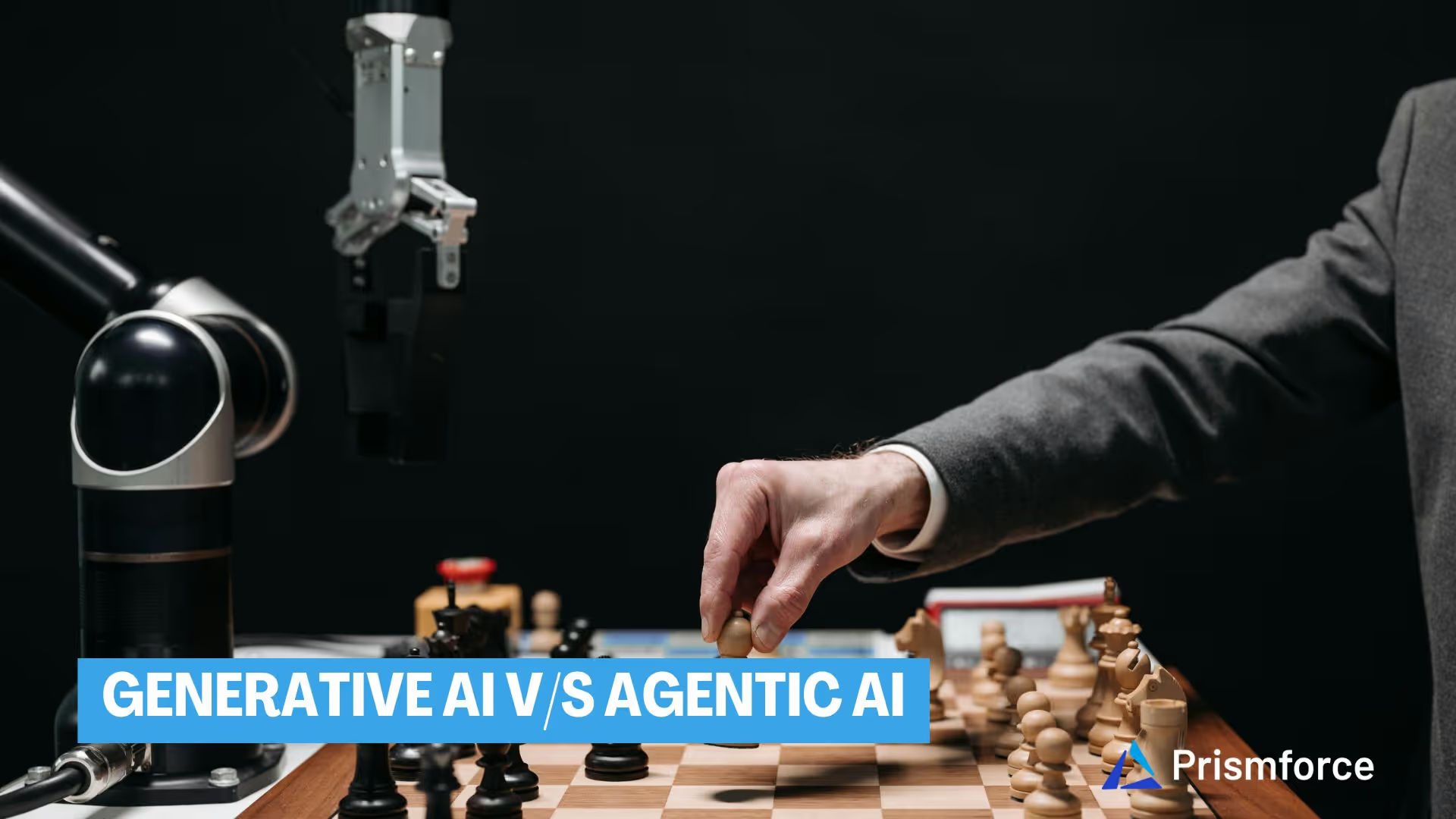
HR teams today are being asked to make faster, fairer, and more strategic decisions — with less time, more scrutiny, and systems that still run on spreadsheets and good intentions.
Enter: Agentic AI.
Not just another HR tech buzzword. This is AI with goals, autonomy, and the ability to make decisions — not just predictions. And it’s coming for your HR stack.
In this blog, we’ll unpack what Agentic AI really means for the people side of the enterprise:
How it enhances decision-making, reduces bias, integrates with your existing tools , and why it’s not (only) a job candidate’s nightmare.
Quick take away in 60 seconds
- What Agentic AI in HR actually means — and how it differs from traditional AI tools.
- Why it's becoming mission-critical in modern HR: from decision-making to bias detection.
- How these AI agents operate with autonomy, adaptability, and real-time analytics.
- What their core capabilities are, including integration, security, and transparency.
- Where they’re being used across key HR functions like recruiting, performance management, and workforce planning.
- What benefits to expect — like improved efficiency, fairer outcomes, and scalability.
- How to start implementing it with a trusted platform like Prismforce.
Who This Blog Is For
This blog is for anyone shaping the future of HR:
- HR professionals looking to improve decision-making and reduce bias
- Recruiters who want faster, fairer, data-driven hiring
- AI developers & data scientists building intelligent systems for people ops
- Legal advisors & ethicists ensuring compliance and transparency in automation
- Managers & business leaders scaling teams with smarter tech
- Job candidates curious (or cautious) about how AI influences hiring
If you’re involved in how people are hired, managed, or supported at work — Agentic AI is your business.
Let’s break it down, starting with the basics. 👇
What Is Agentic AI in HR?
Agentic AI in HR refers to artificial intelligence systems capable of autonomous decision-making, proactively performing tasks such as candidate screening, employee onboarding, and workforce planning. It utilizes machine learning and natural language processing to independently execute HR tasks, enhancing efficiency, reducing bias, and improving overall HR operations.
The Evolution and Impact of Agentic AI in HR
Since its inception, agentic AI has transformed from a theoretical concept to a practical tool reshaping HR operations. Organizations have moved beyond using AI for simple automation to deploying agentic AI for complex, adaptive tasks that require contextual understanding and decision-making capabilities.
A notable impact of agentic AI in HR is its ability to significantly reduce the time-to-hire. For instance, Chipotle Mexican Grill implemented an AI-powered virtual assistant named Ava Cado to manage its recruitment process. Since its deployment, the average application-to-employment time decreased from 12 days to just four, and the application completion rate rose from 50% to over 85%.
This evolution signifies a shift towards more efficient, unbiased, and strategic HR practices, positioning agentic AI as a pivotal component in the future of human resources.
Why Agentic AI Is Playing a Crucial Role in Human Resources
Agentic AI is rapidly becoming a mainstay in modern HR strategies, offering transformative benefits that extend beyond mere automation. Here's an in-depth look at why this technology is pivotal for HR functions:
1. Enhanced Decision-Making and Efficiency
Agentic AI systems autonomously handle complex HR tasks, such as talent acquisition and performance management, leading to significant productivity gains. A Salesforce survey indicates that HR leaders anticipate a 327% increase in agentic AI adoption over the next two years, resulting in a 30% boost in productivity.
2. Bias Mitigation and Ethical Compliance
By leveraging data-driven algorithms, agentic AI can help in skill based hiring, identifying and reducing unconscious biases in recruitment and promotion processes. This ensures a more equitable workplace and helps organizations adhere to ethical standards and compliance requirements.
3. Real-Time Analytics and Adaptability
Agentic AI provides HR professionals with real-time insights into workforce dynamics, enabling swift responses to changing conditions. This adaptability is crucial for managing dynamic HR processes and aligning them with organizational goals.
4. Integration with Existing HR Systems
Modern agentic AI solutions are designed to seamlessly integrate with existing HR platforms, enhancing user experience without overhauling current systems. This integration facilitates a smoother transition and maximizes the utility of both new and existing technologies.
5. Scalability Across Large Organizations
Agentic AI's scalability allows it to manage HR functions across large enterprises efficiently. Its ability to operate autonomously with minimal oversight makes it an invaluable asset for organizations aiming to scale their HR operations without proportionally increasing resources.
How Do AI Agents Work in HR?
Imagine having a junior HR associate who never sleeps, learns continuously, and proactively handles tasks without constant supervision. That's the essence of AI agents in HR. Unlike traditional AI tools that require explicit commands, AI agents are autonomous systems capable of perceiving their environment, making decisions, and taking actions to achieve specific HR objectives.
From Reactive Tools to Proactive Partners
Traditional HR software functions like a calculator—you input data, and it provides an output. In contrast, AI agents resemble a GPS navigation system: they assess real-time conditions, anticipate obstacles, and adjust routes to reach the destination efficiently. In HR, this means AI agents can:
- Source and screen candidates by analyzing resumes and matching them with job requirements.
- Schedule interviews by coordinating calendars and sending invitations.
- Conduct initial assessments through chatbots or automated questionnaires.
- Provide onboarding support by guiding new hires through necessary documentation and training modules.
These agents operate continuously, learning from each interaction to improve future performance.
Data-Driven Decision Making
AI agents analyze vast amounts of data to support HR decisions. For instance, they can identify patterns in employee turnover, predict which employees might be at risk of leaving, and suggest interventions to improve retention. A study published on arXiv demonstrated that fine-tuned large language models like GPT-3.5 achieved a precision of 0.91 and recall of 0.94 in predicting employee attrition, outperforming traditional machine learning models.
Rapid Adoption and Growth
The adoption of AI agents in HR is accelerating. According to HR Executive, the market for AI agents is projected to grow at a rate of 45% annually over the next five years. This growth is driven by the need for more efficient, scalable, and adaptive HR solutions
Integration and Ethical Considerations
AI agents are designed to integrate seamlessly with existing HR systems, enhancing their capabilities without requiring a complete overhaul. However, their deployment raises ethical considerations, such as ensuring transparency in decision-making processes and mitigating biases in recruitment and evaluation. Organizations must establish governance frameworks to oversee AI agent activities and maintain trust among employees.
In summary, AI agents are transforming HR from a reactive function to a proactive, strategic partner. By automating routine tasks, providing data-driven insights, and continuously learning, they enable HR professionals to focus on more complex and human-centric aspects of their roles.
Core Capabilities of AI Agents in HR
AI agents in HR are not just tools—they're autonomous collaborators reshaping the HR landscape. Their core capabilities extend beyond automation, enabling strategic decision-making and enhancing employee experiences.
1. Autonomous Decision-Making
Agentic AI can independently execute complex HR tasks, such as candidate screening and performance evaluations, by analyzing vast datasets to make informed decisions. This autonomy reduces the need for constant human oversight, allowing HR professionals to focus on strategic initiatives.
2. Real-Time Analytics and Insights
By continuously monitoring HR metrics, Agentic AI provides real-time insights into workforce trends, employee engagement, and productivity levels. This capability enables organizations to respond swiftly to emerging issues and make data-driven decisions.
3. Bias Mitigation
AI agents can capture and identify skills to reduce unconscious biases in recruitment and promotion processes by standardizing evaluations and focusing on objective criteria. This leads to more equitable hiring practices and diverse workplaces
4. Seamless Integration
Designed to integrate with existing HR systems, AI agents enhance current workflows without requiring a complete system overhaul. This seamless integration ensures a smooth transition and maximizes the utility of both new and existing technologies.
5. Enhanced Employee Experience
AI agents can provide personalized support to employees by answering queries, guiding them through onboarding processes, and offering tailored learning opportunities. This personalized approach improves employee satisfaction and engagement.
In summary, AI agents in HR offer autonomous decision-making, real-time analytics, bias mitigation, seamless integration, and enhanced employee experiences. These capabilities position AI agents as essential partners in modern HR strategies, driving efficiency and fostering a more inclusive workplace.
Key Applications of Agentic AI in Human Resource Functions
Agentic AI is reshaping HR by transitioning from passive automation to proactive, decision-making systems that drive efficiency and enhance employee experiences. Here are the pivotal applications making a significant impact:
1. Autonomous Talent Acquisition
Agentic AI streamlines the recruitment process by autonomously sourcing candidates, screening resumes, and scheduling interviews. This reduces time-to-hire and ensures a more efficient hiring process.
2. Personalized Employee Onboarding
By tailoring onboarding experiences to individual roles and learning styles, agentic AI enhances new hire integration, leading to improved retention and engagement.
3. Continuous Performance Management
Agentic AI facilitates real-time performance tracking and feedback, enabling managers to address issues promptly and support employee development effectively.
4. Predictive Workforce Planning
Through data analysis, agentic AI predicts workforce trends, helping HR teams to plan for future hiring needs and skill development proactively.
5. Enhanced Employee Support
AI-driven chatbots and virtual assistants provide employees with instant access to HR information, policies, and support, improving overall satisfaction and productivity.
Benefits of Implementing Agentic AI in HR
1. Smarter, Faster Decision-Making
Agentic AI enables HR teams to make more confident decisions by processing high volumes of workforce data and surfacing patterns and predictions in real time. For instance, AI can analyze historical performance data, correlate it with skills, and recommend the best internal candidates for critical roles — instantly. As Harvard Business Review outlines, AI-assisted decision-making not only improves speed but also boosts accuracy in complex, multi-stakeholder environments.
2. Bias Mitigation at Scale
Human bias — unconscious or otherwise — continues to be one of the toughest challenges in HR. Agentic AI, when designed with fairness in mind, can detect and reduce bias in hiring, promotions, and performance evaluations. According to the World Economic Forum, AI models trained on diverse datasets and monitored for fairness can significantly reduce discriminatory outcomes, especially in large-scale recruiting.
3. Real-Time Workforce Insights
One of the most powerful features of agentic AI is the ability to offer real-time analytics on workforce trends, productivity, attrition risks, and skills availability. This allows HR leaders to move from reactive firefighting to proactive planning. As shown in Deloitte's Human Capital Trends, organizations using AI-driven people analytics are better positioned to align workforce strategy with business outcomes.
4. Operational Efficiency & Cost Savings
AI agents can automate repetitive tasks like scheduling interviews, answering policy queries, or filtering applications, giving HR teams back valuable time. McKinsey & Company estimates that up to 30% of HR tasks can be automated — leading to measurable reductions in cost and improved employee satisfaction through faster response times.
Implement AI Agents in Your Organization’s HR Functions with Prismforce
How Prismforce Is Helping HR Teams Leverage Agentic AI
Platforms like Prismforce's SelectPrism exemplify this shift by embedding Agentic AI into the heart of talent acquisition. Unlike traditional AI, SelectPrism acts as an intelligent hiring partner: autonomously managing everything from candidate sourcing to contextual interviews. It leverages proprietary large language models trained on over 60 million job descriptions and resumes, dynamically adjusting questions during video interviews to ensure skill-relevant and bias-free assessments. Real-time coaching, automated candidate outreach, multimodal assessments, and fraud detection are all built-in—offloading repetitive tasks and accelerating hiring by up to 35%. Seamlessly integrating with ATS, HRIS, and CRM systems, agentic AI doesn’t just support HR professionals—it collaborates with them, making faster, fairer, and data-driven hiring the new standard. .Learn more about Prismforce’s Agentic AI capabilities and explore SelectPrism.



.jpg)

